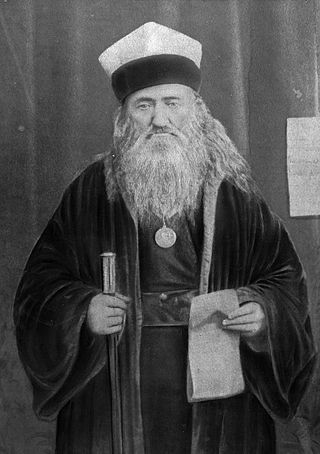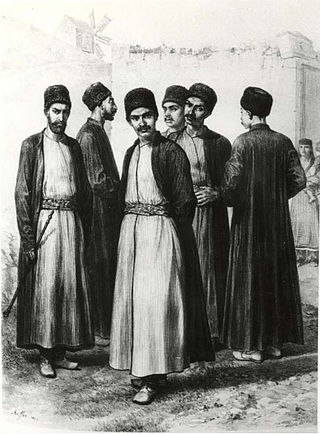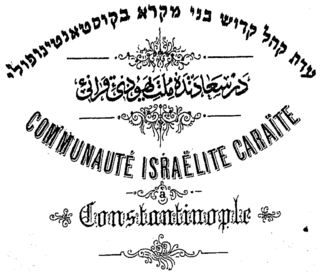
Jewish philosophy includes all philosophy carried out by Jews, or in relation to the religion of Judaism. Until modern Haskalah and Jewish emancipation, Jewish philosophy was preoccupied with attempts to reconcile coherent new ideas into the tradition of Rabbinic Judaism, thus organizing emergent ideas that are not necessarily Jewish into a uniquely Jewish scholastic framework and world-view. With their acceptance into modern society, Jews with secular educations embraced or developed entirely new philosophies to meet the demands of the world in which they now found themselves.
Jewish religious movements, sometimes called "denominations", include diverse groups within Judaism which have developed among Jews from ancient times. Today in the west, the most prominent divisions are between traditionalist Orthodox movements and modernist movements such as Reform Judaism originating in late 18th century Europe, Conservative originating in 19th century Europe, and smaller others.
Karaite Judaism or Karaism is a Jewish religious movement characterized by the recognition of the written Tanakh alone as its supreme authority in halakha and theology. Karaites believe that all of the divine commandments which were handed down to Moses by God were recorded in the written Torah without any additional Oral Law or explanation. Unlike mainstream Rabbinic Judaism, which regards the Oral Torah, codified in the Talmud and subsequent works, as authoritative interpretations of the Torah, Karaite Jews do not treat the written collections of the oral tradition in the Midrash or the Talmud as binding.
Jewish leadership has evolved over time. Since the destruction of the Second Temple in Jerusalem in 70 CE, there has been no single body that has a leadership position over the entire Jewish diaspora. Various branches of Judaism, as well as Jewish religious or secular communities and political movements around the world elect or appoint their governing bodies, often subdivided by country or region.
Benjamin Nahawandi or Benjamin ben Moses Nahawendi was a prominent Persian Jewish scholar of Karaite Judaism. He was claimed to be one of the greatest of the Karaite scholars of the early Middle Ages. The Karaite historian Solomon ben Jeroham regarded him as greater even than Anan ben David. His name indicates that he is originally from Nahawand, a town in Iran (Persia).

Abraham (Avraham) ben Samuel Firkovich was a famous Karaite writer and archaeologist, collector of ancient manuscripts, and a Karaite Hakham. He was born in Lutsk, Volhynia, then lived in Lithuania, and finally settled in Çufut Qale, Crimea, where he also died. Gabriel Firkovich of Troki was his son-in-law.

The Crimean Karaites or Krymkaraylar, also known as Karaims and Qarays, are an ethnicity of Turkic-speaking adherents of Karaite Judaism in Central and Eastern Europe, especially in the territory of the old Polish-Lithuanian Commonwealth and Crimea. "Karaim" is a Russian, Ukrainian, Belarusian, Polish and Lithuanian name for the community.

Hakham is a term in Judaism, meaning a wise or skillful man; it often refers to someone who is a great Torah scholar. It can also refer to any cultured and learned person: "He who says a wise thing is called a hakham, even if he be not a Jew." Hence, in Talmudic-Midrashic literature, wise gentiles are commonly called hakhmei ummot ha-'olam.
Mordecai Sultansky was a Crimean Karaite hakham of the nineteenth century.
Elijah ben Moses Bashyazi of Adrianople or Elijah Bašyazi was a Karaite Jewish hakham of the fifteenth century. After being instructed in the Karaite literature and theology of his father and grandfather, both learned hakhams of the Karaite community of Adrianople, Bashyazi went to Constantinople, where, under the direction of Mordecai Comtino, he studied rabbinical literature as well as mathematics, astronomy, and philosophy, in all of which he soon became most proficient.
Judah ben Tabbai was a Pharisee scholar, av beit din of the Sanhedrin, and one of "the Pairs" (zugot) of Jewish leaders who lived in the first century BCE.
Avraham Ben-Raḥamiël Qanaï, whose original surname was Blank, was born to an Ashkenazi Jewish family that hailed from Romania. Qanaï was on his way to India in 1968 with a stopover in Israel when the late Ḥakham Mordecai Alfandari (1929–1999) met him - the first Karaite he came in contact with in his life - and convinced him of the view that Karaite Judaism was the truth. The late Ḥakham Immanuel Massouda met him shortly afterward and gave him a Ḥakham's cap (hat) as a gift. Qanaï fabricated a story where this registered as his being proclaimed a Ḥakham by Massouda, but this was not at all Massouda's intention.
The Karaite Jewish University is a non-profit corporation incorporated in California, U.S.A., in November 2005 for the purposes of disseminating the study of Karaite Judaism.
Ḥakham Moshe ben Yoseph Firrouz is an Israeli Karaite Hakham and Torah scholar (sage). He is the former Chief Ḥakham as well as Registrar of Marriage and Divorce of Israel's traditional Karaite Jewish Community. He served as Chairman of the Council of Sages of World Karaite Judaism and its religious council. Though Karaites do not have Rabbis, he is considered a Rabbi for the purpose of accommodating the Israeli authorities.

The Constantinopolitan Karaites or Greco-Karaites are a Karaite community with a specific historical development and a distinct cultural, linguistic, and literary heritage stemming from their residency in the capital of the Eastern Roman Empire. There are numerous commonalities between the community and the Rabbinical Romaniote Jews.

Shlomo ben Afeda Ha-Kohen or Solomon Afeda Cohen (1826–1893) was a Karaite Jewish hakham of the nineteenth century considered the last of the Karaite sages of Constantinople. He is famous for his two abridgements of Elijah Bashyazi's masterpiece "Aderet Eliyahu" : Sefer Gefen Ha-Adderet composed in 1860 and Sefer Yeriot Shelomoh composed in 1862. Solomon Cohen proposed shortening the prayers of the Karaite festivals with the aim to attract more Karaites to the temple (Knessa). He also worked as a scribe and composed many poems.








